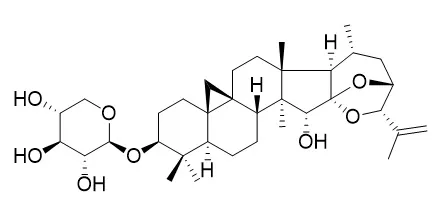| Kinase Assay: |
| J Ethnopharmacol. 2011 Jan 27;133(2):336-44. | | Isoimperatorin, cimiside E and 23-O-acetylshengmanol-3-xyloside from Cimicifugae rhizome inhibit TNF-α-induced VCAM-1 expression in human endothelial cells: involvement of PPAR-γ upregulation and PI3K, ERK1/2, and PKC signal pathways.[Pubmed: 20937376 ] | The methanol extract of Cimicifugae Rhizome has been traditionally used in various disorders including inflammation. The aim of the study is to explore whether anti-inflammatory action of 3 active compounds, two triterpenoid glycosides (Cimiside E, 23-O-actylshengmanol-3-xyloside) and one furanocoumarin (isoimperatorin), isolated from Cimicifugae Rhizome is related with peroxisome proliferator-activated receptor-γ (PPAR-γ) expression in human umbilical endothelial cell line, EA.hy926 cells.
METHODS AND RESULTS:
Cell viability and production of reactive oxygen species were performed. In addition, adhesion of monocyte into endothelial cells and western blot for expression of adhesion molecules and signal proteins were investigated in tumor necrosis factor-α (TNF-α)-activated cells. Pretreatment of test compounds significantly reduced reactive oxygen species (ROS) production and expression of vascular cell adhesion molecule-1 (VCAM-1), but not intercellular cell adhesion molecule-1 (ICAM-1). Three compounds all dose-dependently increased not only PPAR-γ expression in EA.hy926 cells but inhibited TNF-α-induced phosphorylation of Akt, extracellular-signal-regulated kinase (ERK) and protein kinase C (PKC) with different specificity. Finally, they prevented TNF-α-induced adhesion of U937 monocytic cells to EA.hy926 cells.
CONCLUSIONS:
The present results show that Cimiside E, 23-O-actylshengmanol-3-xyloside, isoimperatorin isolated from Cimicifugae Rhizome selectively inhibits TNF-α-induced expression of VCAM-1 at least by upregulation of PPAR-γ, and signals for ERK1/2, PI3K, and PKC are involved in this effect. |
|






 Cell. 2018 Jan 11;172(1-2):249-261.e12. doi: 10.1016/j.cell.2017.12.019.IF=36.216(2019)
Cell. 2018 Jan 11;172(1-2):249-261.e12. doi: 10.1016/j.cell.2017.12.019.IF=36.216(2019) Cell Metab. 2020 Mar 3;31(3):534-548.e5. doi: 10.1016/j.cmet.2020.01.002.IF=22.415(2019)
Cell Metab. 2020 Mar 3;31(3):534-548.e5. doi: 10.1016/j.cmet.2020.01.002.IF=22.415(2019) Mol Cell. 2017 Nov 16;68(4):673-685.e6. doi: 10.1016/j.molcel.2017.10.022.IF=14.548(2019)
Mol Cell. 2017 Nov 16;68(4):673-685.e6. doi: 10.1016/j.molcel.2017.10.022.IF=14.548(2019)